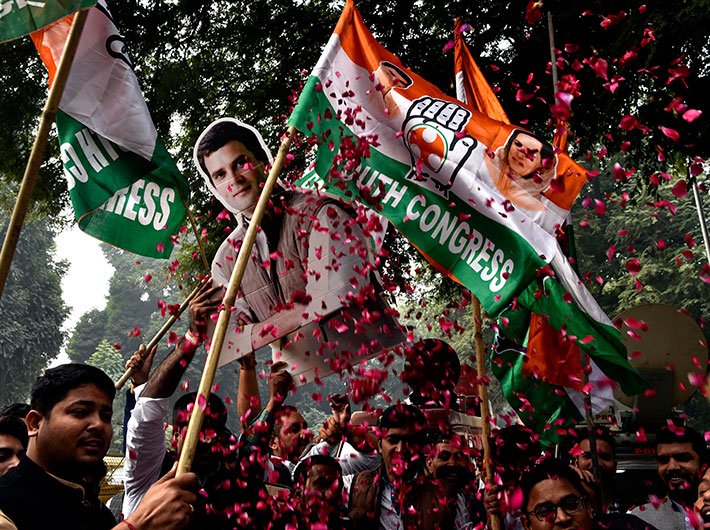The Indian electorate’s tryst with cyclical elections invented a phenomenon called ‘lamppost elections’. Implicit in this formulation was the notion that the people would elect a minion against a titan if they decide to do so. Irrespective of the stature of a leader in front, even a lamppost can be a victor.
Of late this lamppost syndrome is forgotten in the Indian elections. With caste and communal prejudices playing a dominant role in determining the contours of politics, India’s political map developed fault-lines at many levels. Till the emergence of Narendra Modi as the most prominent national leader after Rajiv Gandhi in the late 1980s, each election seemed to be a turf battle on local issues with a party’s organisational structure playing a subsidiary role.
However, the lamppost syndrome seemed to be revived a bit in these state assembly elections in Madhya Pradesh, Rajasthan and Chhattisgarh. More particularly, in Madhya Pradesh, where the BJP and the Sangh Parivar boast of running the most formidable organisational machinery which is perfectly aligned with their political goal, the BJP’s loss is an instructive lesson in political history.
In Rajasthan, much of the blame is placed on the shoulders of the outgoing chief minister, Vasundhara Raje – and the rest on the state’s tendency of 25 years to keep alternating between the two parties. Vasundhara Raje attempted to introduce innovations in governance, but her haughty and aloof ways meant she had little connect with the masses.
Unlike Chhattisgarh’s outgoing chief minister Raman Singh who appeared quite complacently ensconced in his cocoon and believing in his own infallibility, Shivraj Singh Chouhan in Madhya Pradesh was a restless soul, running all around to protect his political turf. He was ably assisted by all constituents of the Sangh Parivar whose deep penetration in the state for decades on end is quite evident. Yet Chouhan lost ground to a less organised and untested leadership of the Congress. In a state where the BJP ruled for 15 years, how this situation has come about?
One obvious answer to this query is the hubris engendered by longevity in public offices. Chouhan’s long innings as the chief minister seemed to have developed an aura of invincibility around himself. Oblivious to the ground slipping away beneath his feet in rural areas on account of economic distress and mafia activity, Chouhan seemed to have believed that his old tricks of social-welfare spending and winning over certain caste groups would sail him through. Unlike the past when his government’s social spending ameliorated the lot of the poor, his welfare schemes triggered more scandals than uplift the poor.
That Chouhan started believing in his own invincibility was evident all across the state where he, accompanied by his wife Sadhna Singh, featured prominently in campaign posters. For the first time, the election campaign posters were seen carrying pictures of the wife of the sitting chief minister. The incongruity of such campaign is not ethical but political. In the Indian context where the family is kept away from public life, Chouhan’s indiscretion was glaring. More so in light of the fact that there were murmurs in power corridors of Bhopal that the Chouhan household wielded undue influence in running the state administration.
It is nobody’s case that Chouhan ran an inefficient administration. Far from it; Chouhan could justifiably be credited with running an efficient government that substantially improved the quality of life of people. For instance, the state had very poor connectivity when it came to roads and electricity only 15 years back. The rural infrastructure was abysmally poor and urban growth was haphazard. No doubt, Madhya Pradesh has now taken a giant leap forward and enhanced its capacity in urban growth and rural infrastructure. It came out of the tag of ‘BIMARU’ states on account of surplus agriculture production.
But all that proved to be of no avail as there was substantial erosion in the credibility quotient of the chief minister that ultimately triggered a fatigue factor. Chouhan’s propensity to stick to time-tested formulae of social spending and mouthing bravados like “Mai ke lal” in support of scheduled castes entailed the law of diminishing political returns. People seemed to become weary of platitudes and took all development works initiated by the BJP government as their entitlements. Apparently Chouhan had lost novelty value while seeking his re-election for the fourth time.
The fact that the BJP still retained support in electoral terms which is bigger than the Congress can justifiably credited to the formidable organisational machinery which remains not only intact but fighting fit. But this election has also blown the myth of the party’s overreliance on the organization at the time of elections. The biggest takeaway of this election is: irrespective of existence of robust organisational machinery, people would choose a lamppost against a ruling titan if they decide to.
[This analysis has appeared on FirstPost.com]

